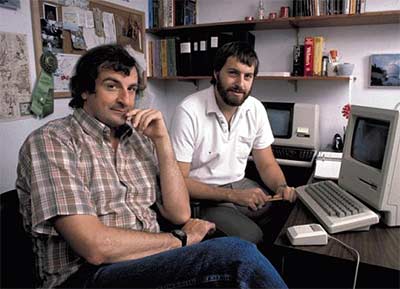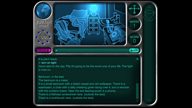- Joined
- Jan 28, 2011
- Messages
- 97,645















The Digital Antiquarian has a fascinating, well-researched and very long article about how Steve Meretzky and Douglas Adams created Infocom's greatest hit: http://www.filfre.net/2013/11/the-computerized-hitchhikers/

I actually played this game when I was a kid (it was old even then, of course). It was very weird and trope-subverting, but not incredibly hard.

For Infocom, whose corporate rise had been almost as meteoric as Meretzky’s personal rise, this was truly the top of the mountain. Adams mentioned them and the game in his appearance on Late Night with David Letterman even as, simultaneously with all of the Hitchhiker’s-related attention, they were being wined and dined by Richard E. Snyder of Simon & Schuster in his private boardroom. Just a week after the Hitchhiker’sshindig in Rockefeller Center they hosted their second (and, as it would turn out, final) big press conference there, to announce their forthcoming database manager Cornerstone. Their booth at that Comdex, where they passed out thousands of free “Don’t Panic!” buttons to all and sundry, was amongst the most frequented and discussed at the show. They got their name onto National Public Radio stations around the country when they sponsored the first Stateside airing in years of the original Hitchhiker’s radio serials. They had truly arrived, and on multiple fronts at that.
The Hitchhiker’s game itself was the biggest hit Infocom had ever had, just as Dornbrook had known it would be. They literally couldn’t make them fast enough to meet demand that Christmas. As Meretzky himself recounted in an article for The New Zork Times, Infocom had to take desperate measures. They leased some more warehouse space just to have someplace to put the avalanche of feelies, boxes, manuals, and diskettes coming in for assembly. Ernie Brogmus, Infocom’s production manager, came to Meretzky to ask if he could organize some help from his white-collar colleagues inside the Wheeler Street offices. That evening Meretzky put a sign-up form on the office billboard for twenty volunteers to come to the assembly plant for a seven-hour shift that Sunday. When he arrived the office next morning at 9:30 there were thirty-five names on it. Forty people actually showed up. Soon Infocom organized a Saturday shift as well as evening shifts: “They were turning up with husbands and wives and mothers and sisters and brothers and friends.” Thanks to such dedication and camaraderie, Infocom in November of 1984 shipped more product than in any month before or after: 62,000 games, 6000 promotional “Sampler Packs,” and 21,000 InvisiClues hint books.
Hitchhhiker’s went on to sell almost 300,000 units, over 200,000 of them in its first year, to become Infocom’s all-time second biggest seller, behind only Zork I, the game that had gotten it all started. Reviews were uniformly stellar. About the only grumbling came from some of Adams’s original British fans, who complained at his decision to work with an American company and at the fact that the game was never made available for the biggest home computer in Britain, the Sinclair Spectrum. “He’s putting the boot into his own fans, the British computer industry, and for all he cares the country itself,” wrote one particularly exercised ex-fan in Popular Computing. In Adams and Infocom’s defense, Sinclair’s decision not to produce a disk drive for the Spectrum made it impractical to port Infocom games to the platform. Publishers like Level 9 serving the thriving British adventure market were also a bit stung by the rejection, but to their credit largely seem to have taken it as motivation to improve rather than grounds for sulking.
Hitchhiker’s is not only of huge commercial and historical importance to Infocom and the adventure game; it’s also of huge artistic interest, with sections that almost feel like a deconstruction of the traditional text adventure. Accordingly, and having now given you the historic and commercial context, I think we should look at the game itself in some detail. Besides, it’s a fun one to write about, full of bits just screaming out for annotation. So, we’ll make that the next item on the agenda.
I actually played this game when I was a kid (it was old even then, of course). It was very weird and trope-subverting, but not incredibly hard.
Ah, memories.Yet it’s also true, as Meretzky freely admits, that that unique Douglas Adams sensibility was essential to making the game the off-kilter, vaguely subversive creation it became. Who else on the planet would have thought to make “no tea” and “a splitting headache” an inventory object? Who would have thought to make the game lie to you? Who would have thought to make the player’s random typo from dozens of moves ago an integral part of the story? Adams pushed Meretzky to, as Mike Dornbrook puts it, “break the rules” that he’d thought were inviolate.












![Have Many Potato [2013] Codex 2013](/forums/smiles/campaign_tags/campaign_potato2013.png)
![The Year of Incline [2014] Codex 2014](/forums/smiles/campaign_tags/campaign_incline2014.png)







